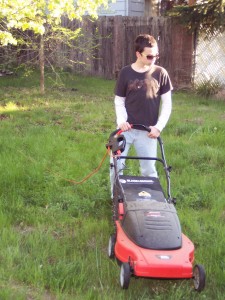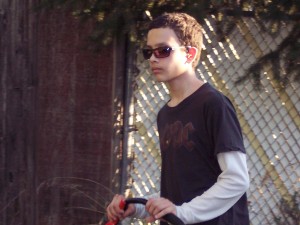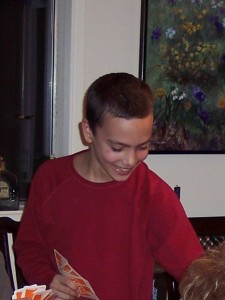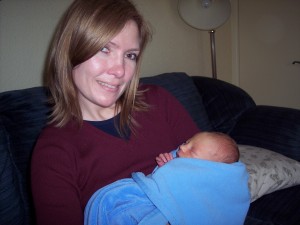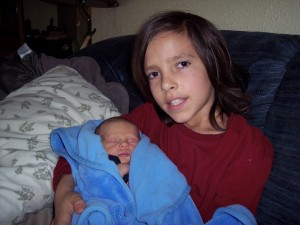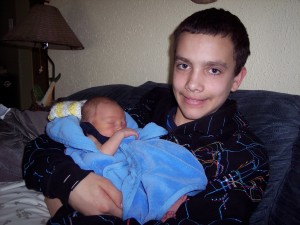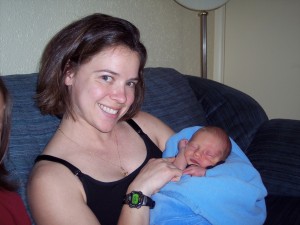My father, who lives about 600 miles away, is coming up for a visit this weekend. We try to see each other at least once a year and have a good relationship. We do, however, differ in our religious views and practices. My dad is an Eastern Orthodox Christian, and I – how to put this diplomatically? – am on my own path.
I wanted my kids to have a basic knowledge of historical biblical events and an acquaintance with the stories I had grown up with. After all, they are ingrained in so much of our culture. When someone mentions Moses and the Ten Commandments, David and Goliath, Adam and Eve, or, of course, Jesus and Mary, I want my sons to at least be familiar with them. Nigel loves the historical aspect of the Bible and any accounts of natural disasters and plagues. Aidan, I think, likes being able to assure his great-grandmother, a lifelong Catholic, that he knows about the Bible when she gives him a book on the lives of the saints or the real story of Christmas. She must figure that since we don’t attend church, the kids would not know about these things. Regardless, Aidan graciously accepts whatever book she brings for him.
But Nigel is not able to understand that religion is personal, that people could easily be insulted if he is not reverent about their beliefs. On his own, he has researched and espoused evolutionism; he values its scientific basis. It does not surprise me that it appeals to him, due to his own evolution within the parameters of autism. Even so, he still has some room for God in his belief system. “It’s kind of half-and-half,” he says. “I’m undecided.” And that’s okay. He has enough to figure out with learning algebra, writing essays, processing sensory input, regulating his emotions, and navigating the social realm of his peers. Trying to understand religion might be too much for him now. Yet, biblical history, like all history, fascinates Nigel.
Several years ago, we had visited my dad at his home, and at the time, his living room also functioned as a part-time chapel for his church group. The room was filled with lavish icons on the walls, crosses, and prayer books. One icon depicted Jesus carrying the cross on his back. Nigel took it all in, but did not say anything as his verbal skills were undeveloped then. A few years later, my dad moved, and this time when we went to visit, Nigel commented on the icons. “What’s with all the God stuff?” he asked me, in no way realizing that his question had been worded irreverently. I explained to him that it was part of Grandpa’s religion and that it was very important to him.
And so, in an effort to show his grandfather that he respected his beliefs, the following year when Grandpa came to visit us at our house, Nigel had an idea. He must have wanted to surprise everyone, because he didn’t tell me about it ahead of time. Shortly after my father had arrived and was in the guest room unpacking, I walked into my room to get something and saw, through my bedroom window, some movement in the backyard. It was Nigel. He had taken some boards from the old backyard fence that had recently been taken out and nailed them together to form a life-size cross. And he held it on his back over one shoulder and, hunched over as he had seen Jesus in Grandpa’s icon, was slowly carrying it across the backyard.
My father has always been very accepting of Nigel’s autism and supportive. But he doesn’t always understand the myriad ways in which autism affects Nigel. I didn’t want him to see Nigel with the cross because I feared that he would think that Nigel was making fun of Jesus. Nigel, at age 10, did not have the capacity to make fun of anyone or anything, but when you aren’t able to spend much time with an autistic child, you don’t always realize that. You wouldn’t know how differently he thinks compared to other kids.
So I sprinted outside and told Nigel that I knew he was trying to be respectful, but that other people wouldn’t see it that way. And I told him that I didn’t want him getting splinters or poking himself with nails. He looked confused. “I’m being Jesus,” he said. “Yes, honey, I know. And you’re doing a really good job. I’m sure Jesus would be pleased. But he wouldn’t want you to get hurt on the rusty nails.” Nigel seemed to agree with that. We set the cross on the woodpile and went back in the house. And I thought, isn’t that what Christianity is really about? Being Jesus? No matter what path he’s on, I can’t help but think that Nigel’s got more figured out than I could ever realize.

